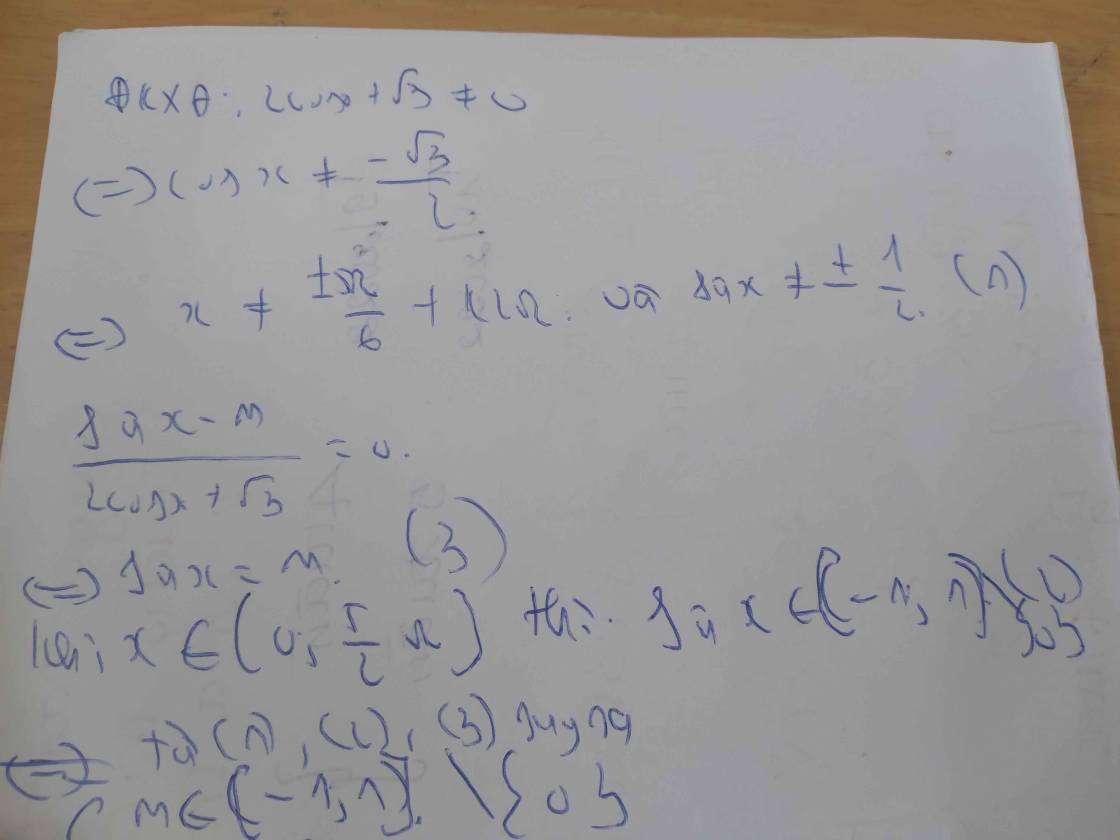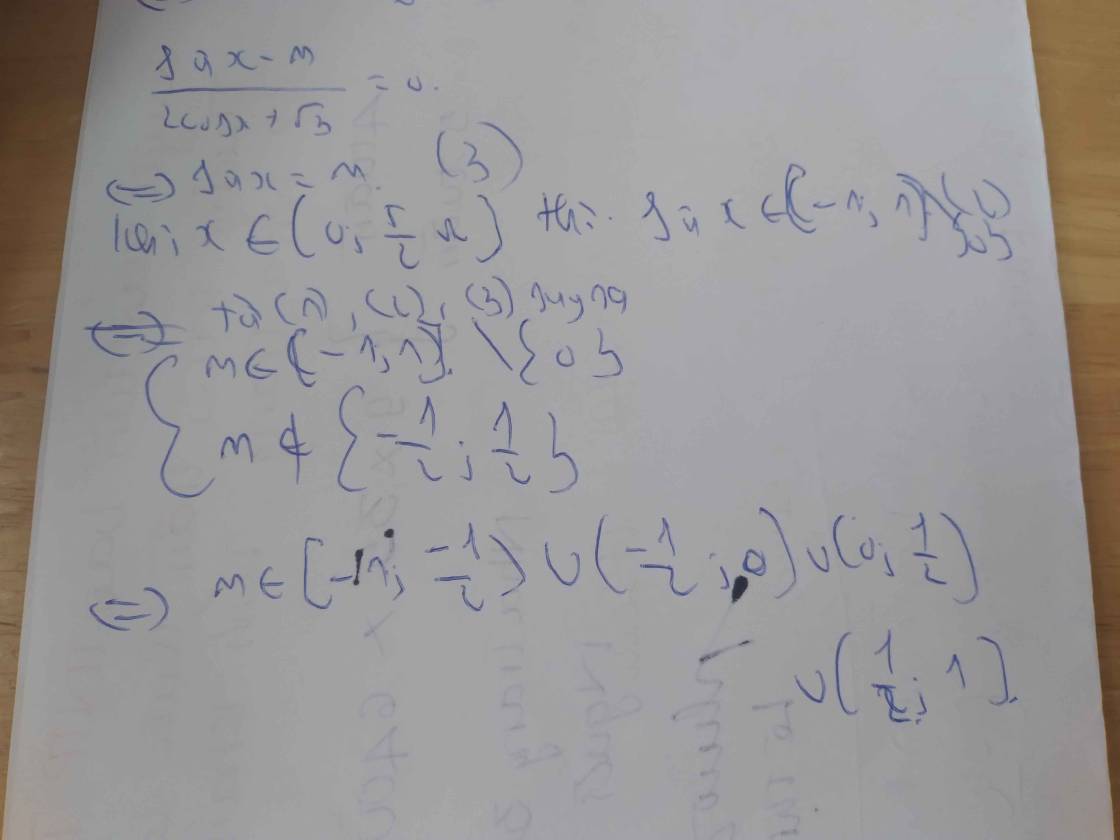


Hãy nhập câu hỏi của bạn vào đây, nếu là tài khoản VIP, bạn sẽ được ưu tiên trả lời.




1.
Hàm tuần hoàn với chu kì \(2\pi\) nên ta chỉ cần xét trên đoạn \(\left[0;2\pi\right]\)
\(y'=\frac{-4}{\left(cosx-2\right)^2}.sinx=0\Leftrightarrow x=k\pi\)
\(\Rightarrow x=\left\{0;\pi;2\pi\right\}\)
\(y\left(0\right)=-3\) ; \(y\left(\pi\right)=\frac{1}{3}\) ; \(y\left(2\pi\right)=-3\)
\(\Rightarrow\left\{{}\begin{matrix}M=\frac{1}{3}\\m=-3\end{matrix}\right.\)
\(\Rightarrow9M+m=0\)
2.
\(\Leftrightarrow y.cosx+y.sinx+2y=2k.cosx+k+1\)
\(\Leftrightarrow y.sinx+\left(y-2k\right)cosx=k+1-2y\)
Theo điều kiện có nghiệm của pt lượng giác bậc nhất:
\(\Rightarrow y^2+\left(y-2k\right)^2\ge\left(k+1-2y\right)^2\)
\(\Leftrightarrow2y^2-4k.y+4k^2\ge4y^2-4\left(k+1\right)y+\left(k+1\right)^2\)
\(\Leftrightarrow2y^2-4y-3k^2+2k+1\le0\)
\(\Leftrightarrow2\left(y-1\right)^2\le3k^2-2k+1\)
\(\Leftrightarrow y\le\sqrt{\frac{3k^2-2k+1}{2}}+1\)
\(y_{max}=f\left(k\right)=\frac{1}{\sqrt{2}}\sqrt{3k^2-2k+1}+1\)
\(f\left(k\right)=\frac{1}{\sqrt{2}}\sqrt{3\left(k-\frac{1}{3}\right)^2+\frac{2}{3}}+1\ge\frac{1}{\sqrt{3}}+1\)
Dấu "=" xảy ra khi và chỉ khi \(k=\frac{1}{3}\)
Đáp án A

3.3 d)
\(\sin8x-\cos6x=\sqrt{3}\left(\sin6x+\cos8x\right)\\ \Leftrightarrow\sin8x-\sqrt{3}\cos8x=\sqrt{3}\sin6x+\cos6x\\ \Leftrightarrow\sin\left(8x-\dfrac{\pi}{3}\right)=\sin\left(6x+\dfrac{\pi}{6}\right)\\ \Leftrightarrow\left[{}\begin{matrix}8x-\dfrac{\pi}{3}=6x+\dfrac{\pi}{6}+k2\pi\\8x-\dfrac{\pi}{3}=\pi-\left(6x+\dfrac{\pi}{6}\right)+k2\pi\end{matrix}\right.\\ \Leftrightarrow\left[{}\begin{matrix}x=\dfrac{\pi}{4}+k\pi\\x=\dfrac{\pi}{12}+k\dfrac{\pi}{7}\end{matrix}\right.\)
3.4 a)
\(2sin\left(x+\dfrac{\pi}{4}\right)+4sin\left(x-\dfrac{\pi}{4}\right)=\dfrac{3\sqrt{2}}{5}\\ \Leftrightarrow2cos\left(\dfrac{\pi}{2}-x-\dfrac{\pi}{4}\right)+4sin\left(x-\dfrac{\pi}{4}\right)=\dfrac{3\sqrt{2}}{5}\\ \Leftrightarrow2cos\left(-x+\dfrac{\pi}{4}\right)+4sin\left(x-\dfrac{\pi}{4}\right)=\dfrac{3\sqrt{2}}{5}\\ \Leftrightarrow2cos\left(x-\dfrac{\pi}{4}\right)+4sin\left(x-\dfrac{\pi}{4}\right)=\dfrac{3\sqrt{2}}{5}\\ \)
Chia hai vế cho \(\sqrt{2^2+4^2}=2\sqrt{5}\)
Ta được:
\(\dfrac{1}{\sqrt{5}}cos\left(x-\dfrac{\pi}{4}\right)+\dfrac{2}{\sqrt{5}}sin\left(x-\dfrac{\pi}{4}\right)=\dfrac{3}{4}\\ \)
Gọi \(\alpha\) là góc có \(cos\alpha=\dfrac{1}{\sqrt{5}}\)và \(sin\alpha=\dfrac{2}{\sqrt{5}}\)
Phương trình tương đương:
\(cos\left(x-\dfrac{\pi}{4}-\alpha\right)=\dfrac{3}{4}\\ \Leftrightarrow x=\pm arscos\left(\dfrac{3}{4}\right)+\dfrac{\pi}{4}+\alpha+k2\pi\)

1/ ĐKXĐ: \(\cos2x\ne0\)
\(\frac{\cos4x}{\cos2x}=\frac{\sin2x}{\cos2x}\)\(\Leftrightarrow\cos4x-\sin2x=0\)
\(\Leftrightarrow2\cos^22x-1-\sin2x=0\)
\(\Leftrightarrow2-2\sin^22x-1-\sin2x=0\)
\(\Leftrightarrow2\sin^22x+\sin2x-1=0\)
\(\Leftrightarrow\left[{}\begin{matrix}\sin2x=\frac{1}{2}=\sin\frac{\pi}{6}\\\sin2x=-1=\sin\frac{-\pi}{2}\end{matrix}\right.\)
\(\Leftrightarrow\left[{}\begin{matrix}2x=\frac{\pi}{6}+2k\pi\\2x=\frac{5\pi}{6}+2k\pi\\2x=\frac{-\pi}{2}+2k\pi\left(l\right)\\2x=\frac{3\pi}{2}+2k\pi\left(l\right)\end{matrix}\right.\)
\(\Leftrightarrow\left[{}\begin{matrix}x=\frac{\pi}{12}+k\pi\\x=\frac{5\pi}{12}+k\pi\end{matrix}\right.\)
2/ \(\sin2.4x+\cos4x=1+2\sin2x.\cos\left(2x+4x\right)\)
\(\Leftrightarrow2\sin4x.\cos4x+\cos4x=1+2\sin2x.\left(\cos2x.\cos4x-\sin2x.\sin4x\right)\)
\(\Leftrightarrow2\sin4x.\cos4x+\cos4x=1+2\sin2x.\cos2x.\cos4x-2\sin^22x.\sin4x\)
\(\Leftrightarrow2\sin4x.\cos4x+\cos4x=1+\sin4x.\cos4x-\sin4x+\cos4x.\sin4x\)
Đến đây bn tự giải nốt nhé, lm kiểu bthg thôi bởi vì đã quy về hết sin4x và cos4x r

<=> cos ( x- pi/5) = cos pi/6
<=> x-pi/5 = pi/6 + 2k pi k thuộc z
x-pi/5 = -pi/6 + 2kpi
<=> x= 11pi/30 + 2kpi
x=pi/30 + 2k pi k thuộc z
sau đó bạn thay k vào ( k thuộc z)
nếu cái nào thỏa mãn thì lấy